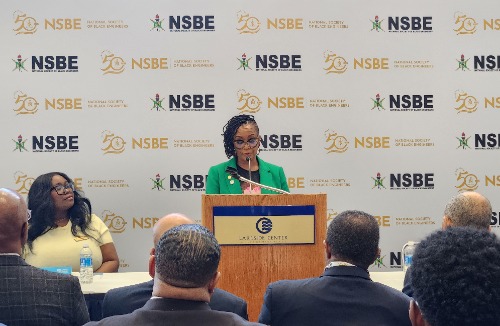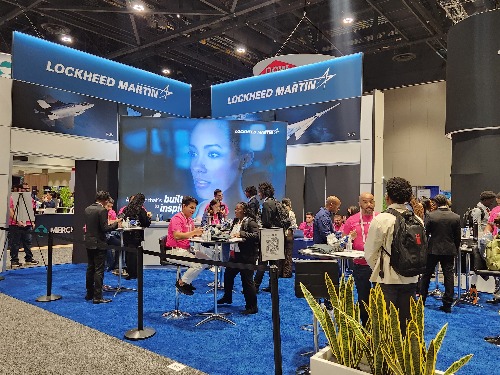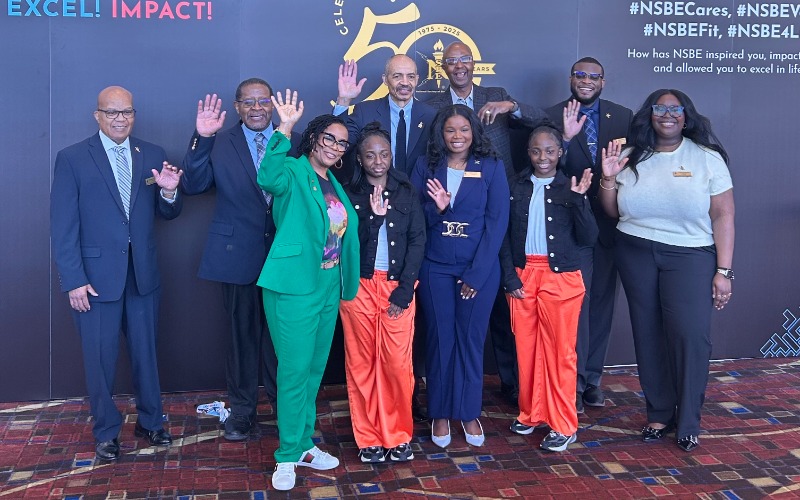For nearly 50 years, the National Society of Black Engineers (NSBE) has been a driving force in fostering diversity, inclusion, and excellence in STEM fields. At its recent 51st Annual Convention in Chicago, the organization celebrated its impact with major milestones, including the city’s official recognition of National Society of Black Engineers Week and the induction of two young STEM prodigies, Camarria and Camerria Williams, as lifetime NSBE members.
Innovation & Tech Today spoke with NSBE CEO Janeen Uzzell and Dr. Tiffini Andorful. They shared insights on what makes NSBE’s programs so impactful, the role of mentorship and leadership, and how the organization continues to support members from student life into the workforce.
Innovation & Tech Today: What makes NSBE’s programs special for students in STEM fields?

Janeen Uzzell: NSBE is such an incredible space to nurture, develop, and activate a passion for STEM. Our programs make learning fun, inclusive, and relevant to students who participate.
We also have a broad range of programming that covers varying age groups for entry. Our Summer Engineering Experience for Kids draws youth who have completed 3rd grade math, through the 5th grade, and connects them with other students within the community for 3 weeks of immersive learning and activities in STEM.
Our environments allow for cross-cultural interaction while also allowing the students to see instructors, mentors, and others who reflect their lifestyles and backgrounds. Our Pre-College Initiative (PCI) programming builds on the scholastic experience with additional programming where chapters are formed, student leaders take on roles to guide their members, and often work on local challenges with STEM solutions.
It’s awesome to watch a student from a local community work with classmates and others to make an issue known within their community or school (traffic safety, waste, cyber safety) and then apply the learnings from their NSBE advisors, chapters, and peer groups to present resolutions.
NSBE students not only advance in STEM, but also sharpen their public speaking skills, reading skills, self-awareness, understanding of team dynamics, and ultimately become more confident and independent. Our Summer Engineering Experience for Kids has designed a longitudinal research study highlighting proof points that students who have matriculated through our programming are going on to study STEM in college. In instances where NSBE students don’t follow the path of STEM, they continue to excel academically and make a positive impact on their communities. Our programming provides a consistent, safe space to practice greatness in a field that desperately needs a pipeline for sustainability—that is special.
Dr. Tiffini Andorful: NSBE is a truly unique community that fosters development at every stage of a STEM career. Building on the passion ignited through our Pre-Collegiate programs, including our flagship Summer Engineering Experience for Kids, we continue to nurture that enthusiasm by providing growth and development opportunities at the collegiate and professional levels.
Collegiate members can secure internships, receive mentorship, and benefit from various scholarships that support their academic and professional growth. Our National Leadership Institute (NLI) provides tailored training for students and professional leaders, equipping them with critical skills in strategic planning, financial management, and crisis management, all of which are directly applicable to their careers. Professional members also engage in Special Interest Groups (SIGs), which connect individuals with shared technical interests and career aspirations, fostering collaboration and innovation.
The impact of NSBE extends far beyond individual programs. It’s about the lifelong community and network it builds. For example, Janeen’s experience as an NSBE member and leader at NC A&T highlights how this organization not only shaped her early career but also provided a lasting professional support system. At every level, NSBE creates pathways for success and ensures that its members are equipped to lead in STEM fields. This is the power of NSBE.
I&T Today: Can you share how NSBE has helped your career or the careers of others?
Uzzell: The programming I mentioned didn’t exist when I was in grade school. I joined NSBE as a college student and immediately became a part of the chapter leadership model, as well as a scholarship recipient. As a member of NSBE, I found my tribe, and my like-minded classmates, many of whom remain close friends more than 30 years later.
The rigor of study, the lab work, and special projects all make the collective time of an engineering student one of collaboration. Learning to seek help, work together, share knowledge, and just hold each other accountable was key to the NSBE model.
Each chapter gives the group what it needs. At North Carolina Agricultural and Technical State University (NC A&T), we all agreed that we would start together and end together. It’s something my former classmates and I still say to one another when we see each other at homecoming and special events. NSBE launched my career, taking the totality of my academic experience and shaping me for my first job in Manufacturing at Ethicon (a division of Johnson & Johnson)—a job that I secured at one of the NSBE national conferences. Mission accomplished—and yet so much more. Even as we celebrated the NSBE 50th Anniversary in Chicago just a few weeks ago, I was surrounded by friends that I’ve had across schools and regions—decades later, all because of NSBE. We remain sounding boards, references, business partners, and each other’s keepers. That is NSBE.

I&T Today: How does it feel to have Chicago officially declare March 5-9 as National Society of Black Engineers Week? What does this recognition mean for NSBE?
Uzzell: It is certainly an honor to have Chicago recognize NSBE by this declaration. And not only NSBE as a society, but also the fact that our founders are Chicago natives and are a reflection of hope, prosperity, and patriotism for the city. They deserve to be recognized for the brave steps they took in 1975 in establishing the then Society of Black Engineers and for continuing to build professional careers and positively impact the city of Chicago and the world. Having this week declared as NSBE week is a nod from the Mayor and city officials to those who have gone before them to provoke change and societal shifts and a bow to the organization that holds a membership of thousands who continue to lead, build, and solve the world’s toughest challenges.
I&T Today: Camarria and Camerria Williams were given lifetime NSBE memberships. What does it mean to honor young students like them for their achievements?
Uzzell: We are so proud of these young ladies! They are inspirational and the future STEM leaders that the world needs. NSBE is honored to have them as a part of our family, and I am confident that our programming can be a part of nurturing their interests and keeping them connected and STEM-focused. Our youth need to be affirmed for their greatness, recognized, and celebrated! The world consistently shines a light on the weaknesses within the Black culture, rarely elevating our stories of positive impact. I believe that who tells your story matters, and we wanted to make sure that others knew that these twins had worked on a project presented to them by way of a community program (The Boys & Girls Club of America) where they were challenged in their thought process, had to practice creativity, patience in determining results and designing a conclusion that will have a long-term impact on the residents’ health within a community that they are a part of.
This is the story that needed to be shared, and bringing them into the NSBE fold will add voice to their work, which will drive greater impact. It is also my hope that Camarria and Cammerria recognize possibilities through the time they spent with all the NSBE members in Chicago. We put them front and center for more than 17,000 attendees to applaud and celebrate. Not one person in that arena had to know the twins personally to stand on their feet and recognize their efforts. If you’re a part of NSBE, you likely can relate to some portion of their story, whether it is familial, community, academic, or personal. We get it, so we wanted to make sure they know we’re proud of them. I look forward to them being a part of our student leadership model in the years to come. We haven’t seen the last of these young ladies. In fact, I believe it is just the beginning of the good that is in store for them.
I&T Today: How does NSBE continue to support its members as they move from school to their careers in the workforce?
Uzzell: The reach of NSBE includes professional membership once you graduate. There are citywide chapters as well as national leadership for this cohort of members. Through the National Professionals Board, the members experience training opportunities, convention experiences (Professional Development Conference, PDC, and the Technical Professional Conference, TPC), as well as exposure to recruiters and partners seeking more advanced workforce placement. I’ve heard stories of NSBE members who relocate for work and life opportunities and join local professional chapters where they make friends with other NSBE alumni and get further rooted in their new environment. NSBE remains a place where all members can leverage the resources that help in all areas, from career development, job opportunities, volunteerism, Board service, peer mentoring, and of course, the best annual gathering where we all come together to reignite.
Andorful: NSBE continues to support its members as they transition from school to the workforce through tailored professional development opportunities. The Professional Development Conference (PDC) provides an intimate space for early-career professionals and established professionals to engage in meaningful growth. Attendees can participate in workshops, continuing education courses for professional development credits, and extensive networking opportunities. This year, PDC will take place in New Orleans in August.
Additionally, Special Interest Groups (SIGs) serve as a bridge between NSBE graduate students and technical professionals, fostering engagement in specialized fields. These groups focus on areas such as process improvement, aerospace, energy, healthcare, intellectual property, public policy, transportation, women in science, innovation, and entrepreneurship, among others. SIGs offer technical workshops, develop innovative products, build task forces, and host forums that address critical industry and community challenges. Through these initiatives, NSBE ensures a continuum of professional development, equipping members with the resources and networks they need to thrive in their careers.











